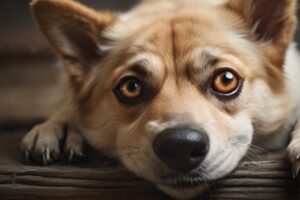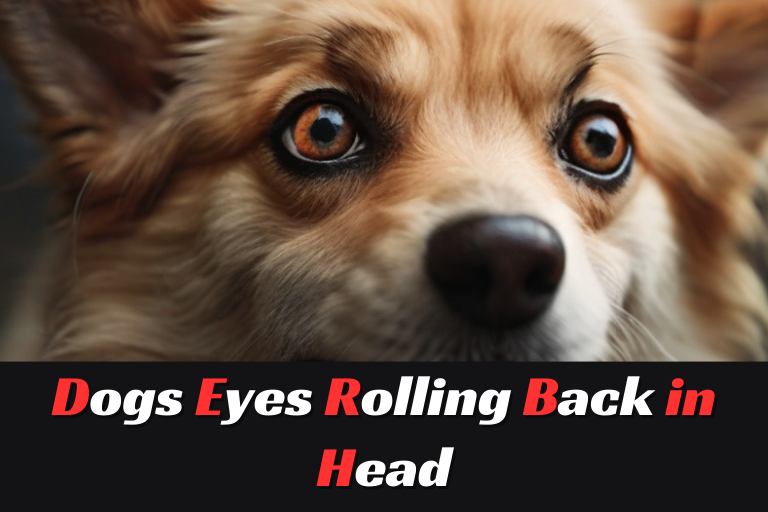Dogs Eyes Rolling Back in Head
Let’s explore the topic “Dogs Eyes Rolling Back in Head”
Introduction
Have you ever noticed your dog’s eyes rolling back into their head and wondered what it means? It’s a curious sight that can leave dog owners puzzled and concerned.
In this detailed exploration, we delve into the phenomenon of dogs’ eyes rolling back and unravel the possible reasons behind this behavior.
Understanding Canine Anatomy

Before we delve into why dogs’ eyes may roll back, let’s first understand the anatomy of a dog’s eye. Unlike humans, who have a prominent white sclera, dogs have less visible sclera due to their evolved hunting instincts.
Their eyes are designed for tracking prey, with a larger field of vision and enhanced night vision capabilities.
Normal Eye Movements in Dogs
Dogs’ eyes exhibit a range of movements that serve various purposes, from tracking objects to expressing emotions. Normal eye movements include scanning their environment, tracking moving objects, and making direct eye contact with humans or other animals.
Possible Causes of Eyes Rolling Back

While dogs’ eyes rolling back may seem alarming, it’s essential to consider potential causes before jumping to conclusions. One possible explanation is stress or anxiety, which can manifest through unusual eye behaviors. Dogs may roll their eyes back as a coping mechanism in stressful situations.
Stress and Anxiety
Just like humans, dogs can experience stress and anxiety in response to various triggers, such as loud noises, unfamiliar environments, or changes in routine. When stressed, dogs may exhibit a range of behaviors, including panting, pacing, whining, and yes, even rolling their eyes back.
Physical Discomfort and Pain

Another possible reason for dogs’ eyes rolling back is physical discomfort or pain. Dogs may roll their eyes back as a response to discomfort caused by medical conditions such as headaches, migraines, or eye irritation. In such cases, it’s essential to address the underlying cause and seek veterinary attention if necessary.
Behavioral Signals
Dogs are masters of non-verbal communication, and their eyes play a crucial role in conveying emotions and intentions.
When dogs roll their eyes back, it may be a subtle signal of discomfort or unease. Paying attention to your dog’s body language and context can provide valuable insights into their state of mind.
Investigating Unconscious Behavior
In some cases, dogs’ eyes may roll back due to unconscious or involuntary movements. Just like humans experience rapid eye movement (REM) sleep, dogs also go through different sleep stages, including REM sleep, during which their eyes may move rapidly under their closed eyelids.
Observing Sleep Patterns

During REM sleep, dogs may exhibit various eye movements, including rolling their eyes back. This is a normal part of the sleep cycle and is not a cause for concern.
However, if you notice other unusual behaviors or signs of distress during sleep, it’s essential to monitor your dog closely and consult a veterinarian if necessary.
Seeking Veterinary Advice
If you’re ever unsure about your dog’s eye behavior or suspect that it may indicate an underlying issue, don’t hesitate to seek veterinary advice.
A qualified veterinarian can conduct a thorough examination, diagnose any potential problems, and recommend appropriate treatment or management strategies.
Conclusion

In conclusion, dogs’ eyes rolling back can be a fascinating yet perplexing sight for dog owners. While it may sometimes indicate stress, discomfort, or unconscious behavior, it’s essential to consider the context and observe other signs of distress or illness.
By understanding your dog’s body language and seeking veterinary advice when needed, you can ensure the well-being and happiness of your beloved canine companion.
FAQs (Frequently Asked Questions)
Here are some FAQs related to Dogs Eyes Rolling Back in Head:
- Is it normal for dogs’ eyes to roll back during sleep?
- Yes, during REM sleep, dogs may exhibit various eye movements, including rolling their eyes back. This is a normal part of the sleep cycle and is not a cause for concern.
- Should I be worried if my dog’s eyes roll back occasionally?
- Occasional eye rolling in dogs may not necessarily indicate a problem, especially if it occurs during sleep or in response to specific stimuli. However, if you notice frequent or prolonged episodes of eye rolling, it’s advisable to consult a veterinarian for further evaluation.
- Can stress or anxiety cause dogs’ eyes to roll back?
- Yes, stress or anxiety can manifest in various ways in dogs, including unusual eye behaviors such as eye rolling. If you suspect that your dog is experiencing stress or anxiety, it’s essential to identify and address the underlying triggers to help alleviate their discomfort.
- What should I do if I notice my dog’s eyes rolling back?
- If you notice your dog’s eyes rolling back and are unsure of the cause, it’s essential to observe their behavior and context closely. If your dog appears distressed or exhibits other signs of illness or discomfort, it’s best to consult a veterinarian for a thorough evaluation and appropriate guidance.
- Are certain dog breeds more prone to eye rolling than others?
- While eye rolling can occur in dogs of any breed, some breeds may be more predisposed to certain eye conditions or structural abnormalities that could affect their eye movements. It’s essential to be aware of breed-specific health concerns and seek appropriate veterinary care when needed.
Related Posts :
- Let’s Understand: Why Westies Are the Worst in 2024?
- Let’s Understand Why Schnauzers Are the Worst Dogs in 2024
- Let’s understand Is Pura Safe for Cats?

